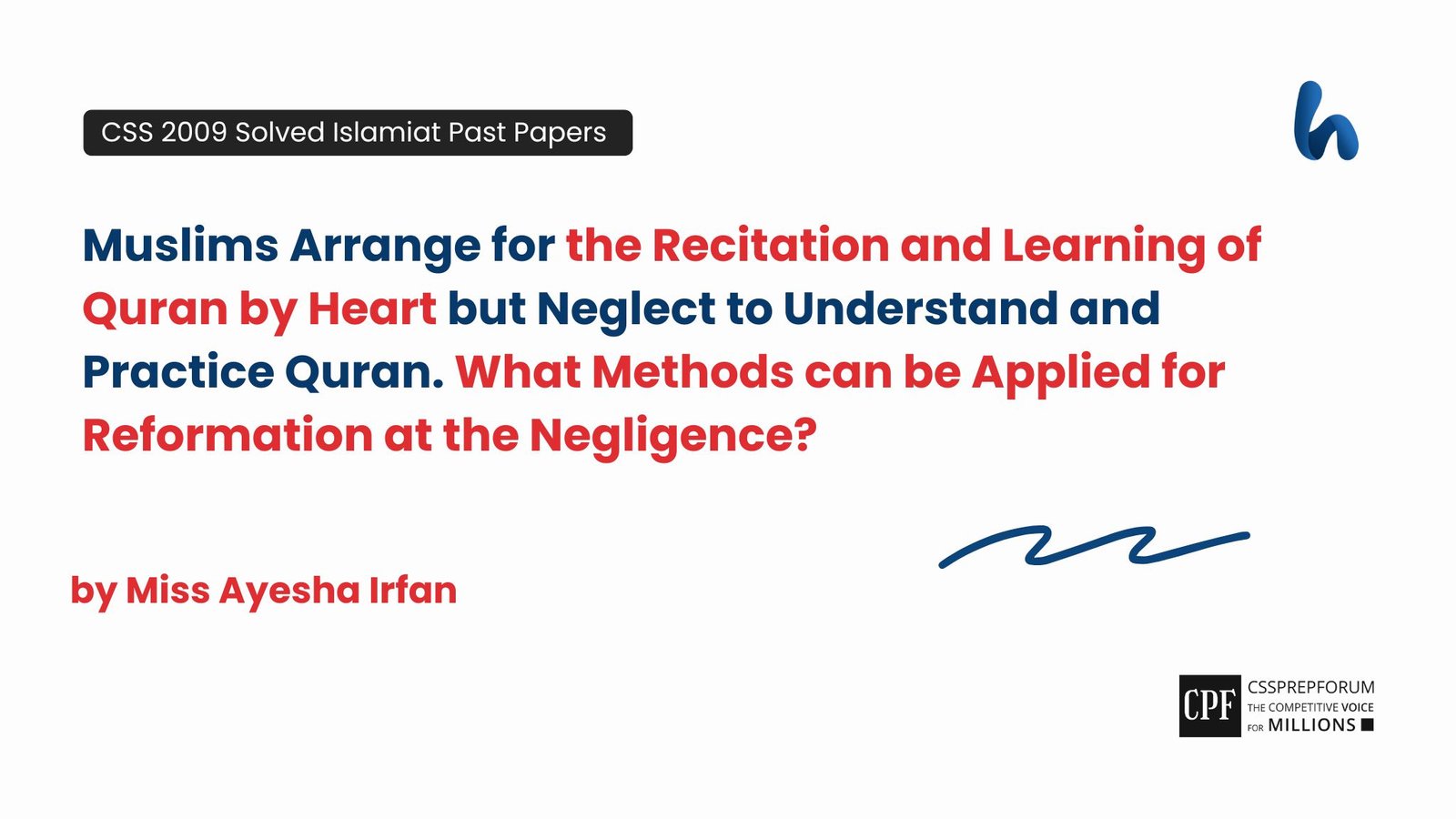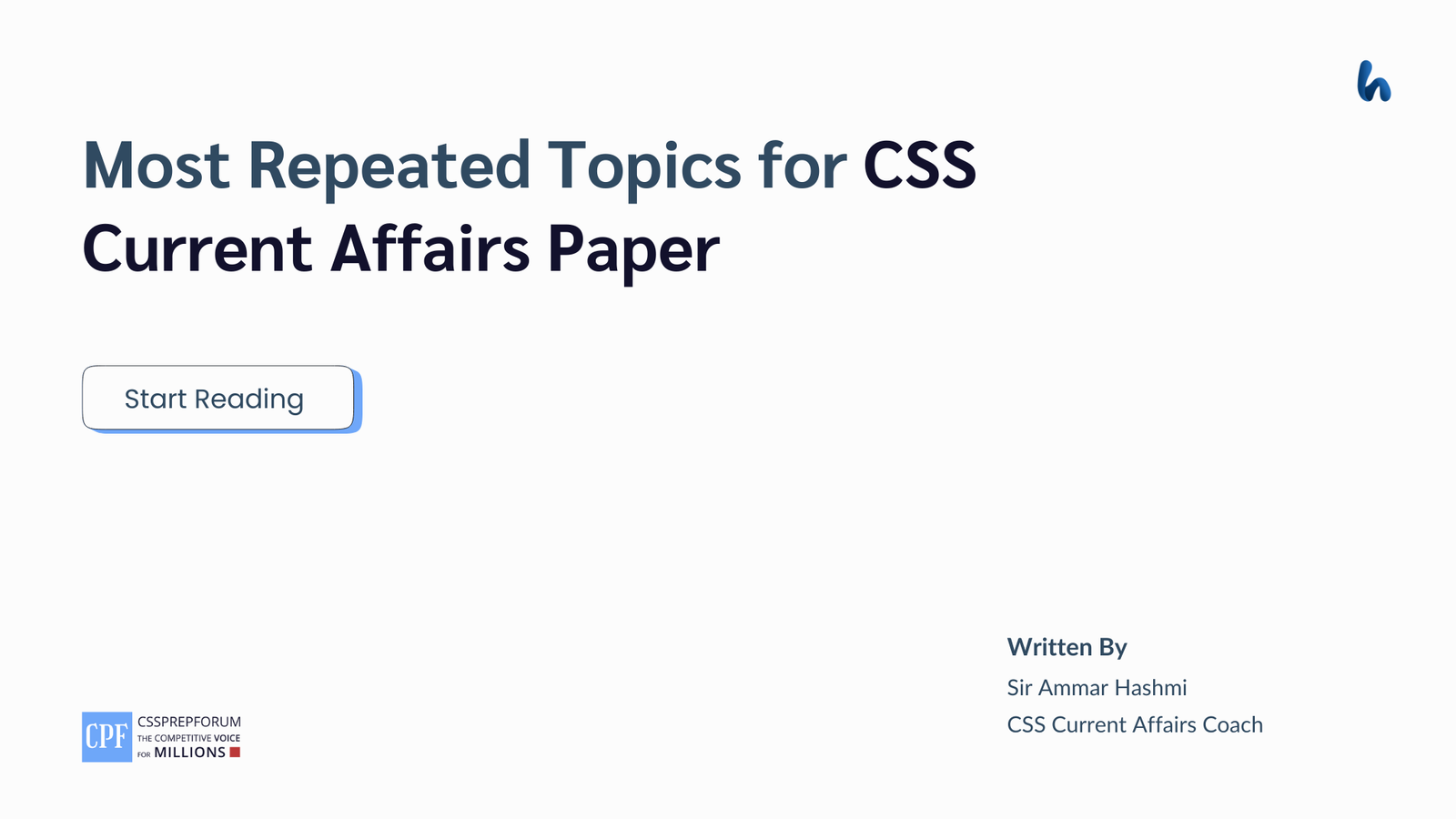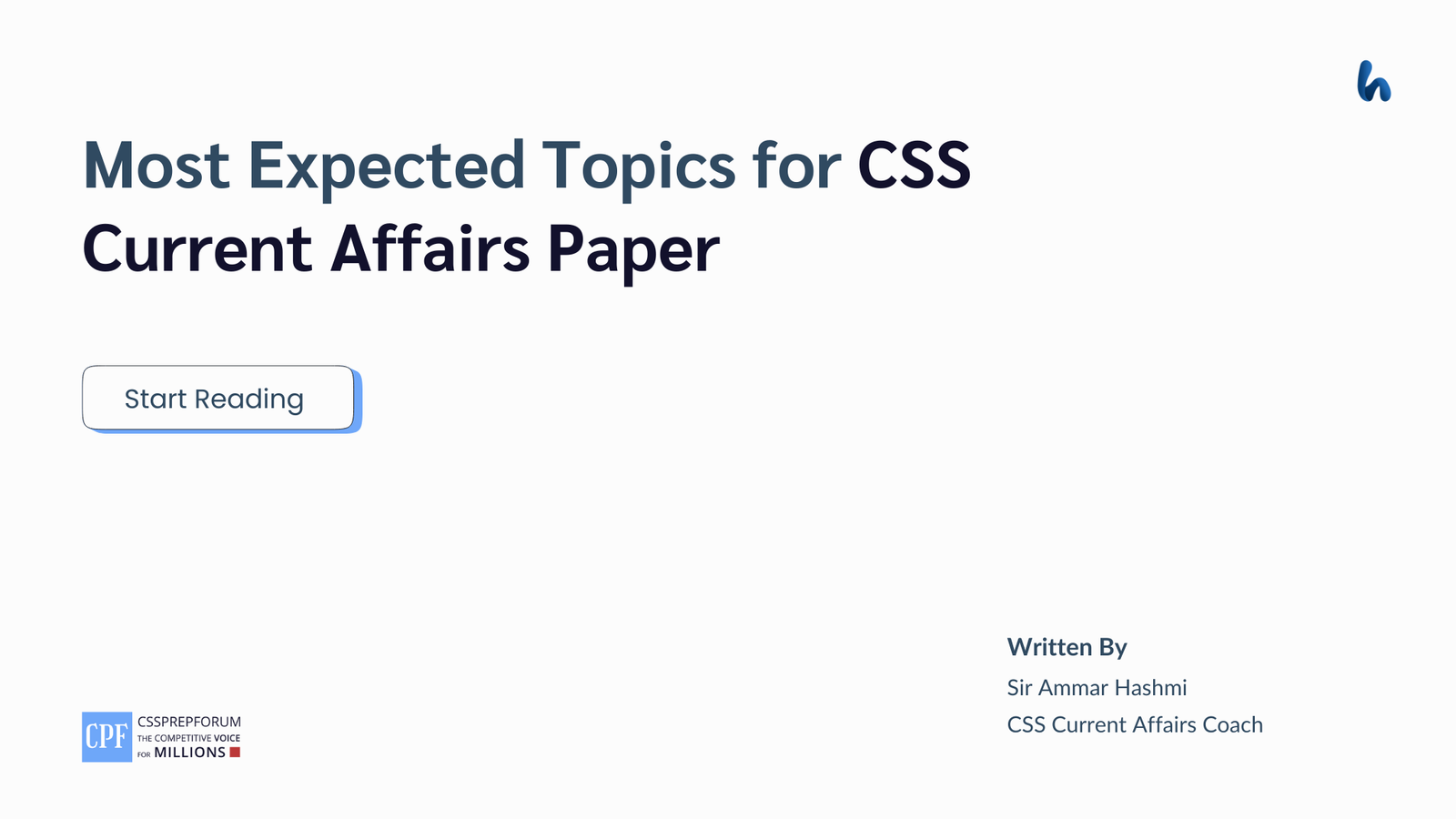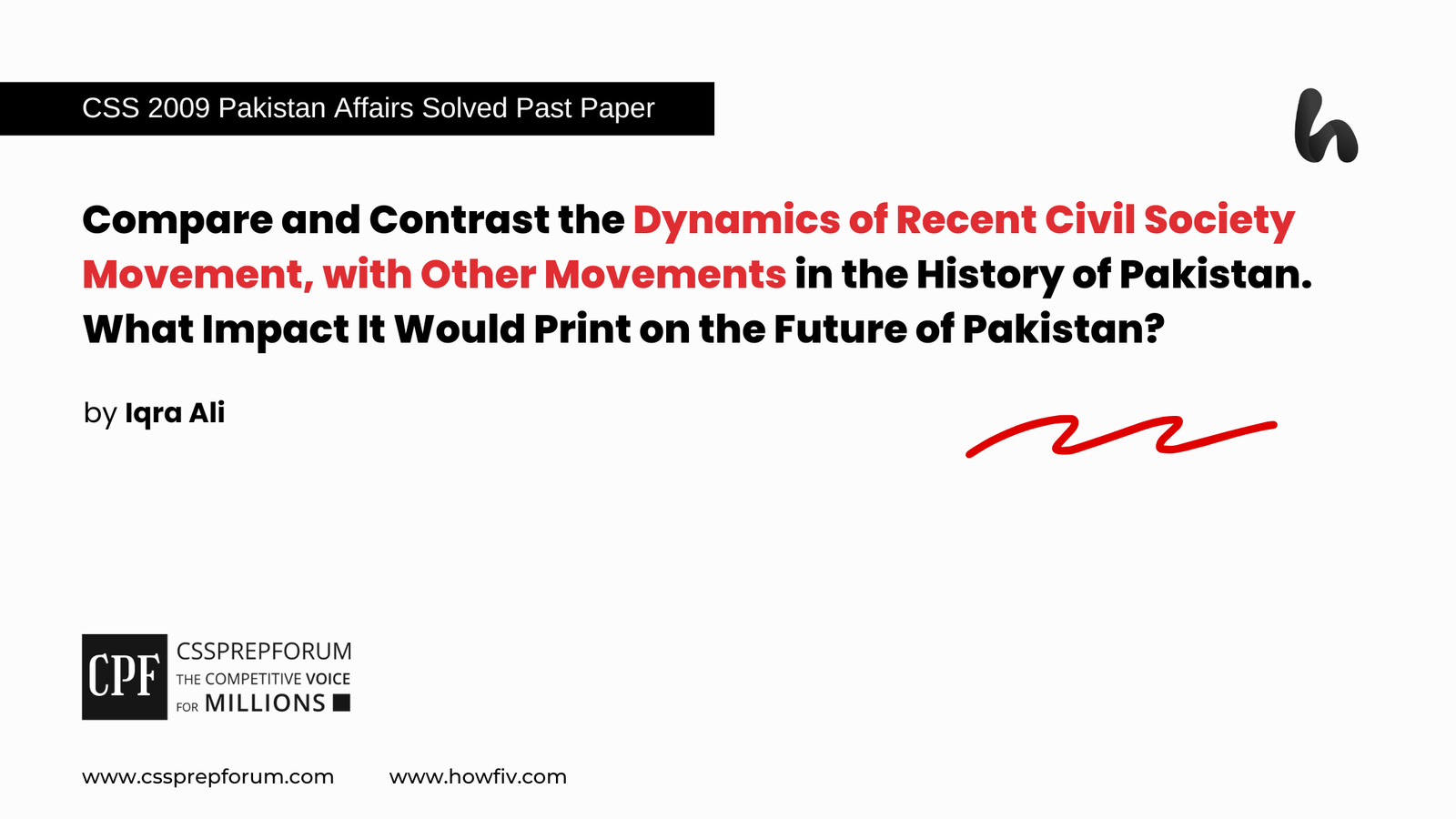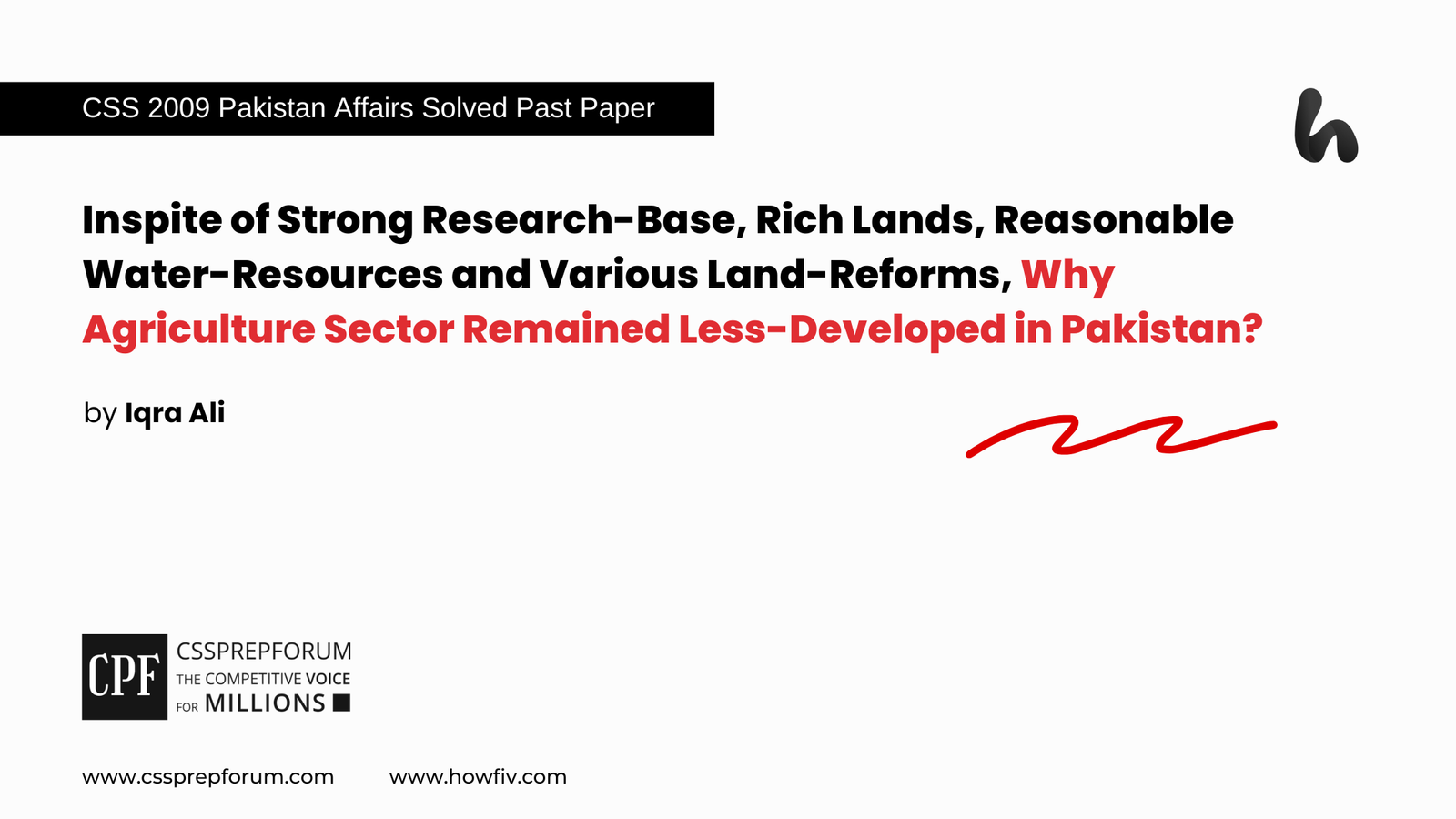CSS 2013 Solved Islamiyat Past Papers | The Judicio-Political System of Islam
The following question of CSS Islamiat 2013 is solved by Miss Ayesha Irfan, the highest scorer in CSS Islamiat. Moreover, the question is attempted using the same pattern taught by Sir Syed Kazim Ali to his students, who have scored the highest marks in compulsory subjects for years. This solved past paper question is uploaded to help aspirants understand how to crack a topic or question, write relevantly, what coherence is, and how to include and connect ideas, opinions, and suggestions to score the maximum.

Question Breakdown
The examiner has asked to explain the Judicio-Political System of Islam. First, we explain the judicial system of Islam and then explain the political system of Islam with the significance of governance of Islam. After that, a critical analysis will act as the icing on the cake.
Outline
1-Introduction
2-Explaining the judicial system of Islam
2.1-Mian characters of the judicial system
- ✔Divine foundation based on the Quran and Sunnah
- ✔Purpose: Justice, equity, and social harmony
2.2-Sources of Islamic Law
- ✔Primary Sources: Quran and Sunnah
- ✔Secondary Sources: Ijma (consensus), Qiyas (analogy), Ijtihad (independent reasoning)
2.3-Principles of Justice in Islam
- ✔Equality before the law and Accountability to Allah
- ✔Presumption of innocence and Protection of individual rights
2.4-Roles and Duties in the Judiciary
- ✔Qadi (Judge): Appointment, qualifications, and responsibilities and Witnesses: Importance and role in court proceedings
- ✔Mufti: Providing legal opinions (Fatwas)
2.5-Flexibility and Modern Applications
- ✔Role of Ijtihad for Contemporary Issues
- ✔Adaptation in modern Islamic countries
3- Explaining the political system of Islam
3.1- Core Principles of the Islamic Political System
- ✔Sovereignty of Allah, Equality and Accountability
- ✔Justice (Adl) and Shura (Consultation)
3.2- Types of Governance in Islam
- ✔Caliphate: Ideal model (leadership under the Khalifa)
- ✔Imamate: Leadership in certain Islamic sects and Modern Variants: Integration with democratic frameworks
3.3- Duties and Responsibilities of Islamic Leaders (Caliphs)
- ✔Ensure implementation of Shariah and Protect public rights and welfare
- ✔Maintain justice and security and Promote education and morality
3.4- Concept of Shura (Consultation)
- ✔Role of Advisory Councils
- ✔Participation of citizens in decision-making
3.5- Rights and Duties of Citizens in an Islamic State
- ✔Protection of life, property, and honour and No secular-religious divide
- ✔Obligation to obey just leadership and Participation in governance through consultation
4-Critical analysis
5-Conclusion

Answer to the Question
Introduction
Based on Islamic concepts drawn from the Quran and Sunnah, the Islamic Judicio-Political System is a complete structure that unifies judicial power and government. This system guarantees that all political and judicial strategies are in accordance with divine law by accentuating the significance of fairness and impartiality, accountability, and moral rectitude. The ideas of Khilafat (vicegerency), Risalat (prophecy), and Tawhid (the unity of God) are foundational to this ideology since they together validate political authority as a consecrated trust. Under this scaffolding, the court functions autonomously and is charged with maintaining Sharia and making sure that fairness is served in society to nurture a society that manifests Islamic norms and principles.
Explaining the Judicial System of Islam
2.1- Mian characters of the judicial system
- Divine foundation based on the Quran and Sunnah
Indeed, the Islamic judicial system highlights the judiciary’s autonomy, allowing judges (Qadis) to make unbiased actions based on testimony and Shariah, consequently stimulating liability and justice. The Islamic judicial system is distinguished by its divine substructure, anchored in the principles of the Quran and the Sunnah, which impart the legitimate and moral structure for impartiality. As Allah says: “And if you judge (O Muhammad), judge between them with justice. Verily, Allah loves those who act justly” (5:42). Thus, the system works under Shariah, which encompasses laws acquired from divine sources, guaranteeing that principles of justice and equity regulate all facets of life.
- Purpose: Justice, equity, and social harmony
Moving ahead, the fundamental objective of the Islamic legal system is to advocate social harmony, impartiality, and tranquillity in society. Ensuring egalitarian conduct and safeguarding the basic rights of individuals is its primary purpose, which reflects the idea of impartiality and harmony. Equality is a foundational principle that ensures everyone has equal access to justice and encourages impartiality in court procedures. As Allah states in the Quran: “So their Lord responded to them: “I will never deny any of you—male or female—the reward of your deeds. Both are equal in reward….” (Quran 3:195). Thus, the legal system also nurtures social harmony with the goal of establishing an impartial society where moral principles are respected and communal solidarity is reinforced.
2.2- Sources of Islamic Law
- Primary Sources (Quran and Sunnah)
Moreover, the Quran and Sunnah are the foremost sources of Shariah. The Quran, which is acknowledged as the words of Allah that were revealed to the Prophet Muhammad, contains a wide range of moral panoramas that deal with multiple facets of life. Its verses provide unequivocal instructions and ethical and moral principles that influence Muslims’ reliance and behaviours, creating an underpinning for individual behaviour and interpersonal relationships. As Allah says in the Quran:” Now We have set you ˹O, Prophet˺ on the ˹clear˺ Way of faith. So, follow it, and do not follow the desires of those who do not know the truth” (45:18). The Sunnah explains and expands upon the precepts found in the Quran, providing background information and direction on a range of topics like as interpersonal relations, moral behaviour, and rites. As Allah says in the Quran:” Indeed, in the Messenger of Allah you have an excellent example for whoever has hope in Allah and the Last Day and remembers Allah often” (33:21). Thus, the Quran and Sunnah pursue to stimulate and direct people for a moral existence because of its exquisite language, profound consequences, and emphasis on impartiality and compassion.
- Secondary Sources: Ijma (consensus), Qiyas (analogy), Ijtihad (independent reasoning)
Furthermore, consensus, or Ijma, Qiyas and Ijtihad, are seen as a secondary source of Shariah and are crucial to the formation of Islamic law. Ijma, in response to unique situations or difficulties not mainly covered in the Quran or Sunnah, refers to the consensus of knowledgeable Islamic scholars on a certain legitimate matter or decision, representing a cohesive elucidation of Islamic principles. Consequently, qiyas, or analogy, is the process of comparing confirmed judgments from the Quran and Sunnah with unique circumstances or problems for which the Quran and Sunnah do not provide clear direction. For instance, an example of the use of qiyas is the case of the ban on selling or buying goods after the last call for Friday prayers until the end of the prayer stated in the Quran 62:9. Comparably, Ijtihad is the procedure by which skilled and capable intellectual use their judgment to extract ethical and legitimate culmination from the Qur’an and Sunnah, the two primary sources of Shariah, especially in the absence of an express directive.
2.3- Principles of Justice in Islam
- Equality before the law and Accountability to Allah
Moving down the ladder, Accountability to Allah and equality before the law are the cornerstones of Islamic justice. Equality before the law nurtures neutrality and justice by guaranteeing that all people, regardless of their standing, are dealt with legitimately and equitably in court. For instance, Prophet Muhammad said: “Each of you is a shepherd, and each of you is responsible for his flock. The Amir (ruler) who is over the people is a shepherd and is responsible for his flock”. Thus, these values foster a just and equitable society where people’s rights are respected, and moral behaviour is encouraged.
- Presumption of innocence and Protection of individual rights
Moreover, the concepts of impartiality in Islam include the assumption of innocence and the safeguarding of individual rights. The presumption of innocence dictates that an individual be presumed innocent until found guilty, ensuring that charges do not lead to unfair retribution without strong evidence. For instance, The Prophet said, “There are three categories of people against whom I shall myself be a plaintiff on the Day of Judgement. Of these three, one is he who enslaves a free man, then sells him and eats this money”. Thus, these ideas provide a structure that fosters impartiality and equity in society.
2.4- Roles and Duties in the Judiciary
- Qadi (Judge): Appointment, qualifications, and responsibilities and Witnesses: Importance and role in court proceedings
Furthermore, the Qadi (judge) in the Islamic court is chosen by virtue of their ethical standards, honesty, and understanding of Islamic law (Shariah). They oversee court cases, understand the law, and make sure that impartiality is done. In court, witnesses are essential because they give testimony that establishes evidence and backs up assertions; they must be trustworthy and have high moral behaviour. For instance, the Prophet (PBUH) said that judges are of three types, one of whom will go to Paradise and two to Hell. The one who will go to Paradise is a man who knows what is right and gives judgment; accordingly, but a man who knows what is right and acts tyrannically in his judgment will go to Hell, and a man who gives judgment for people when he is ignorant will go to Hell. Thus, the Qadi and witnesses work together to ensure that the Islamic legitimate system is reasonable and equitable.
- Mufti: Providing legal opinions (Fatwas)
Moreover, Muftis are Islamic scholars who can offer legitimate assessments, or fatwas, that are grounded in Islamic law (Shariah). They comprehend the Qur’an and Sunnah, and they offer recommendations on a variety of legal and ethical issues. For instance, The Messenger of Allah, peace and blessings be upon him, said, “Whoever is given an opinion not based on knowledge, his sin falls upon the one who gave him the opinion. Muftis must possess a thorough understanding of Islamic jurisprudence and assist Muslims in living their lives in accordance with Islamic principles, making sure that Shariah’s application is still relevant to today’s issues.
2.5- Flexibility and Modern Applications
- Role of Ijtihad for Contemporary Issues
Moreover, in Islamic law, Ijtihad is the autonomous intellectual procedure that enables scholars to connect Islamic principles to current situations to cope with current difficulties. Because of its adaptability, Shariah may be used to address changing social conventions and issues while offering pertinent advice on subjects like human rights, economics, and science. As Allah says in the Quran:” And (remember) Dawud (David) and Sulaiman (Solomon) when they gave judgement in the case of the field in which the sheep of certain people had pastured at night, and We were witness to their judgement” (surah anbiyah:78). Thus, Islamic law upholds its fundamental principles and is still relevant to Muslims’ daily lives because of Ijtihad.
- Adaptation in modern Islamic countries
Furthermore, in contemporary Islamic nations, integration entails fusing traditional Islamic principles with modern legitimate and social substructures. Shariah and Islamic legislation are harmonized in many countries to address concerns such as equality between men and women and rights for humanity, frequently resulting in changes to domestic and financial substructures. Scholars may now comprehend Islamic principles in ways that address contemporary societal issues because of the growing recognition of the importance of Ijtihad. This strategy seeks to advance modernity while honouring Islamic tradition.
Explaining the political system of Islam
3.1- Core Principles of the Islamic Political System
- Sovereignty of Allah, Equality and Accountability
Moving ahead, Islam’s political system is founded on fundamental concepts that highlight Allah’s sovereignty as well as the importance of tranquillity and liability. Furthermore, all people are considered equal under the law and are not subjected to prejudice because of ethnicity, gender, or socioeconomic standing, pursuant to the principles of equality and accountability in Islam. As Allah states in the Quran: “Whoever seeks honour and power, then ˹let them know that˺ all honour and power belongs to Allah” (35:10). Because authorities are held responsible for their deeds, a government framework that places a high priority on impartiality and the preservation of individual rights is promoted, guaranteeing that authorities act in the best interests of the society while adhering to instructions of Allah.
- Justice (Adl): Central to governance and Shura (Consultation): Collective decision-making
Moreover, a fundamental tenet of the political system of Islam, justice (Adl) emphasizes equity and the preservation of individual liberties under the framework of government. It guarantees that authorities maintain ethical principles and behave morally. This is complemented by Shura (consultation), which involves people in the governing procedure and fosters group decision-making. The Quranic verse that prominently highlights both “Justice (Adl)” and “Shura (Consultation)” is: “O you who believe! Stand firmly for justice, as witnesses to Allah, even if it is against yourselves, or your parents, or your kindred, be he rich or poor; for Allah is nearer of kin to them than yourselves. So do not follow your own desires, lest you swerve justice. And if you twist [your words] or turn away, verily, Allah is Acquainted with what you do. Thus, to promote an equitable and inclusive society, Adl and Shura work together to provide a political structure that is responsible and representative of Islamic principles.
3.2- Types of Governance in Islam
- Caliphate: Ideal model (leadership under the Khalifa)
Furthermore, under the leadership of the Caliphate, the Prophet Muhammad’s political and spiritual heir, the Caliphate is considered the ultimate form of government in Islam. For instance, It has been narrated on the authority of Abu Huraira that the Messenger of Allah (may peace be upon him) said: People are subservient to the Quraish: the Muslims among them being subservient to the Muslims among them, and the disbelievers among the people being subservient to the disbelievers among them. The Caliphate, which has traditionally served as an anchor of solidarity for Muslims across many cultures and locations, seeks to establish an equitable and just society governed by Islamic values.
- Imamate: Integration with democratic frameworks
Moreover, the Imamate is a system of governance in Islamic tribes where the Imam is considered a leader with both religious and chronological legitimacy. Contrary to this, modern forms of Islamic governance frequently strive to reconcile religious authority with modern political circumstances, establishing a governance structure that upholds Islamic principles while tackling modern issues. This strategy fosters popular engagement and representation while adhering to Shariah.
3.3- Duties and Responsibilities of Islamic Leaders (Caliphs)
- Ensure implementation of Shariah and Protect public rights and welfare
Moving down the ladder, ensuring the application of Islamic law and defending the rights and welfare of the populace are among the obligations and liabilities of Islamic authorities, especially Caliphs. As Allah states: Whosoever kills a human being without (any reason like) man slaughter, or corruption on earth, it is as though he had killed all mankind … (5:32). Caliphs are also supposed to be inspirational figures who govern and make decisions in accordance with Islamic standards.
- Maintain justice and security and Promote education and morality
Moreover, it is the duty of Islamic leaders, especially Caliphs, to uphold impartiality and stability in society. This includes settling conflicts, safeguarding residents from harm, and making sure everyone is treated fairly. As Allah says in the Quran: Indeed, we have dignified the children of Adam, carried them on land and sea, granted them good and lawful provisions, and privileged them far above many of Our creatures. Thus, leaders contribute to the formation of an enlightened and moral society, which is necessary for the general well-being and tranquillity of society, by endorsing educational programs and fostering ethical principles.
3.4- Concept of Shura (Consultation)
- Role of Advisory Councils
Nonetheless, councils, such as the Majlis al-Shura, are essential because they provide policy recommendations and perspectives while making sure that all viewpoints are considered. As the Quran states: “…those who answer the call of their Lord and establish the prayer, and who conduct their affairs by Shura” (42:38). They improve interaction among the society and authorities, encouraging transparency and liability and supporting well-informed decision-making that takes into consideration the expectations of society.
- Participation of citizens in decision-making
Furthermore, democratic administration depends on citizen involvement in decision-making, which enables people to express their thoughts and have an influence on policy through advisory councils and public consultations. By increasing receptiveness, liability, and confidence in the governance, this engagement results in more equitable and efficient initiatives that take into consideration the diverse requirements of the populace.
3.5- Rights and Duties of Citizens in an Islamic State
- Protection of life, property, and honour and No secular-religious divide
Moving down the ladder, the state oversees maintaining impartiality and security, and citizens have the privilege of having their lives, property, and honour protected in an Islamic state. Since Islamic precepts regulate societal affairs and administration, there is no separation between religion and secularism. For instance, Allah states that:” O believers! Do not let some ˹men˺ ridicule others; they may be better than them, nor let ˹some˺ women ridicule other women; they may be better than them. Do not defame one another, nor call each other by offensive nicknames. How evil it is to act rebelliously after having faith! And whoever does not repent, it is they who are the ˹true˺ wrongdoers (49:11). To foster a harmonious and equitable society, citizens are required to carry out their responsibilities, which include upholding the law and assisting with the well-being of the society.
- Obligation to obey just leadership and Participation in governance through consultation
Last but not least, to preserve fairness and order in society, residents of an Islamic state are required to submit to impartial leadership. The authorities’ devotion to moral and ethical standards is a prerequisite for this allegiance. Citizens are invigorated to take part in government through Shura, which gives them a chance to express their views and influence decisions. As Allah says in the Quran, It is out of Allah’s mercy that you, ˹O, Prophet˺, have been lenient with them. Had you been cruel or hard-hearted, they would have certainly abandoned you… (3:159). In addition to promoting liability and openness, this democratic method guarantees that the government represents the interests and collective desires of the society.
Critical analysis
To address Shura issues in the current world, the Judicio-Political System of Islam blends traditional Islamic principles with the requirements of modern administration. While preserving impartiality and tranquillity for all citizens, Shura’s deliberation and Ijtihad’s autonomous intellectual adjust to shifting social, political, and economic circumstances. By allowing disparate groups to actively participate in a conversation structure, it promotes transparency in the decision-making process. By focusing on the implementation of Islamic principles in a modern setting and balancing trust with current concerns like social justice, equality between individual despite their genders, and human rights, it aims to create an inclusive and peaceful society.
Conclusion
The Judicio-Political System of Islam integrates the political and judicial sectors under divine laws that prioritize societal harmony, fairness, and equality. While Ijtihad may be used for issues not specifically addressed and pertaining to the modern world, its foundation in the Quran and Sunnah is intended to protect one’s rights and hold people liable through clearly defined judicial responsibilities. The framework fosters ethical governance and engaged citizenship, resulting in a society that nurtures Islamic values while addressing contemporary issues.

CSS Solved Past Papers’ Essays
Looking for the last ten years of CSS and PMS Solved Essays and want to know how Sir Kazim’s students write and score the highest marks in the essays’ papers? Then, click on the CSS Solved Essays to start reading them.
CSS Solved Essays
CSS Solved General Science & Ability Past Papers
Want to read the last ten years’ General Science & Ability Solved Past Papers to learn how to attempt them and to score high? Let’s click on the link below to read them all freely. All past papers have been solved by Pakistan’s top CSS GSA coach having the highest score of their students.
General Science & Ability Solved Past Papers


